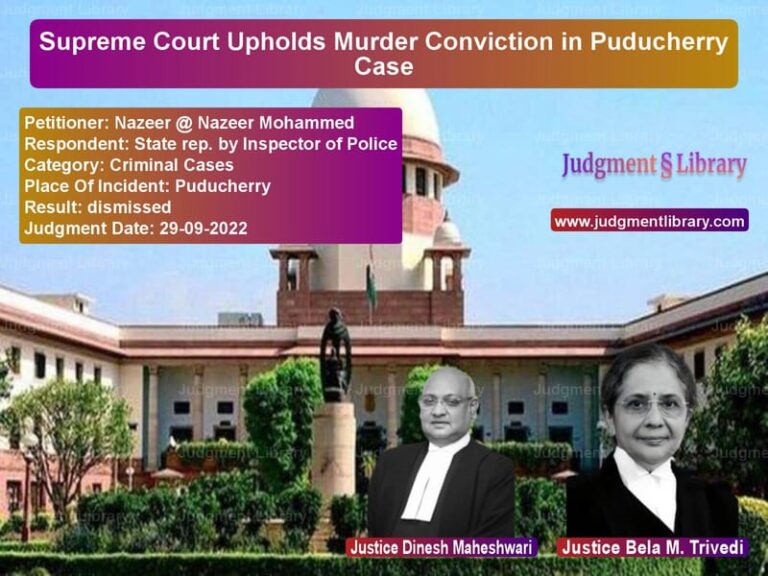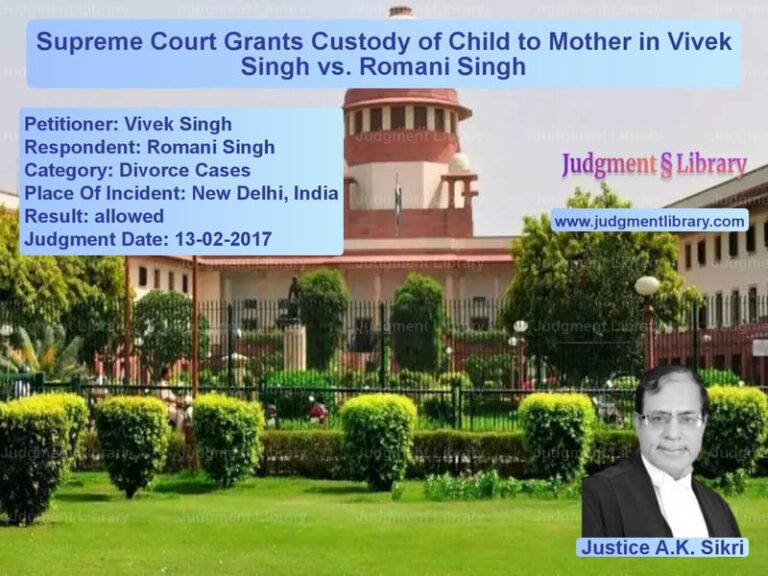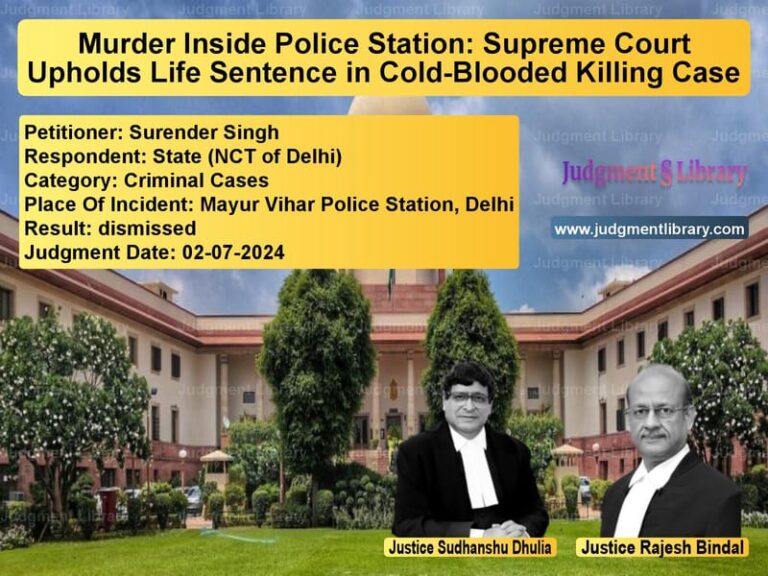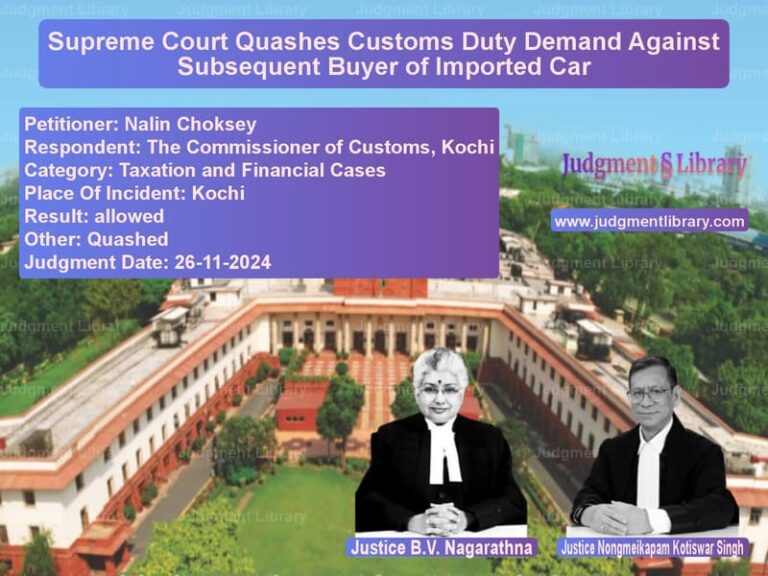High Court’s Revision Petition Reversed: Supreme Court Upholds Trial Court’s Ex-Parte Judgment in Civil Dispute
The case of Mohamed Ali vs. V. Jaya & Others revolves around the legal battle concerning the validity of an ex-parte judgment and decree passed by a Trial Court in a civil suit. The Supreme Court, in its judgment delivered by M.R. Shah and B.V. Nagarathna, set aside the Madras High Court’s order, which had allowed the revision petition and reversed the Trial Court’s ex-parte decision. The judgment reinforces the importance of adhering to procedural requirements in filing revision petitions and upholding the integrity of trial court judgments in civil cases.
The appellant, Mohamed Ali, had initiated a suit for specific performance of a sale agreement against the respondents. The suit was contested, and the respondents failed to appear, leading the Trial Court to pass an ex-parte judgment. However, the respondents later sought to set aside this judgment through revision petitions under Article 227 of the Constitution of India, arguing that the Trial Court’s decree was passed in error. The High Court allowed their revision petitions and set aside the decree, prompting the appellant to challenge the High Court’s decision in the Supreme Court.
Background of the Case
The dispute began with a civil suit filed by Mohamed Ali, the appellant, for the specific performance of a sale agreement dated 17 July 2009. The suit was filed in the year 2010 before the I Additional District Judge (PCR), Trichy, against four defendants. Despite receiving summons, the defendants failed to appear in court, leading to an ex-parte judgment and decree passed by the Trial Court on 31 October 2012.
The defendants, after a delay of 2345 days (approximately six and a half years), filed a petition to set aside the ex-parte judgment and decree, claiming they were not served properly and requesting the delay in filing the petition to be condoned. Additionally, another defendant, who had a delay of 1522 days, also filed a similar petition. The Trial Court rejected both petitions, observing that there was insufficient cause for such long delays. In response, the defendants approached the High Court with revision petitions under Article 227 of the Constitution of India.
Petitioner’s Arguments
The appellant, Mohamed Ali, argued that:
- The revision petitions filed by the respondents were not maintainable under Article 227 as there was a statutory remedy available through appeal.
- The High Court should not have interfered with the Trial Court’s ex-parte judgment without proper consideration of the merits of the case.
- There was a significant delay in filing the petitions to set aside the judgment, and the Trial Court rightly refused to condone the delay.
- Allowing revision petitions in such cases would undermine the authority of the Trial Court’s decisions, particularly when the statutory appeal process was available.
Respondents’ Arguments
The respondents, on the other hand, argued that:
- The Trial Court had made errors in passing the ex-parte judgment without considering the readiness and willingness of the plaintiff to perform the contract, which is a mandatory requirement under the Specific Relief Act.
- They had legitimate reasons for the delay in filing the applications to set aside the ex-parte judgment, including issues related to service of notice.
- The High Court, in its revision jurisdiction, had the authority to correct the error made by the Trial Court and should have set aside the ex-parte decree.
Supreme Court’s Analysis
The Supreme Court thoroughly reviewed the procedural aspects of the case and the judgments passed by the Trial Court and the High Court.
1. High Court’s Jurisdiction under Article 227
The Court first examined the issue of whether the High Court had the jurisdiction to entertain the revision petitions under Article 227 of the Constitution. The Court noted:
“The High Court’s jurisdiction under Article 227 is supervisory and cannot be equated to an appellate jurisdiction. The High Court should have refrained from entertaining the revision petitions when the appeal remedy under the Code of Civil Procedure (CPC) was available.”
2. Statutory Appeal vs. Revision Jurisdiction
The Court emphasized the well-settled principle that when a statutory appeal remedy is available, a revision petition under Article 227 should not be entertained. The Court cited the ruling in Radhey Shyam v. Chhabi Nath:
“The availability of an appeal under the CPC acts as a bar to the exercise of revision jurisdiction under Article 227 of the Constitution, especially when no manifest error or miscarriage of justice is demonstrated.”
3. Delay in Filing Applications
The Supreme Court further observed that the defendants failed to show adequate reasons for the substantial delay of 2345 days in filing their applications to set aside the ex-parte judgment:
“The Trial Court correctly observed that no sufficient cause was shown by the defendants for such a long delay in filing the petitions. The delay of over six years was not satisfactorily explained, and the High Court should have considered this aspect before entertaining the revision.”
4. High Court’s Error in Setting Aside the Trial Court’s Decree
The Court noted that the High Court erred in setting aside the ex-parte judgment and decree passed by the Trial Court without addressing the core issues regarding the legal procedures:
“The High Court intervened in the Trial Court’s decree without considering whether the Trial Court’s refusal to condone the delay was justified, and it wrongly proceeded to exercise appellate powers under Article 227.”
Supreme Court’s Ruling
The Supreme Court ruled:
- The High Court erred in entertaining the revision petitions under Article 227, given the availability of an alternative remedy by way of appeal.
- The Trial Court’s ex-parte judgment and decree was valid, and the refusal to condone the delay in filing the petitions was justified.
- The impugned orders passed by the High Court were quashed and set aside.
- The Trial Court’s decision to reject the applications to condone the delay and the original ex-parte judgment and decree were restored.
Conclusion
The Supreme Court’s ruling reaffirms the importance of adhering to procedural rules and demonstrates that revision jurisdiction under Article 227 should not be used to circumvent established legal remedies like appeals. The Court also emphasized that delays in filing applications must be explained satisfactorily, and the High Court must act within its supervisory jurisdiction without overstepping its bounds.
This case highlights the judicial discipline required in the exercise of revisional jurisdiction and the need for timely legal action, especially in civil disputes concerning property and contract law.
Petitioner Name: Mohamed Ali.Respondent Name: V. Jaya & Others.Judgment By: Justice M.R. Shah, Justice B.V. Nagarathna.Place Of Incident: Madurai, Tamil Nadu.Judgment Date: 11-07-2022.
Don’t miss out on the full details! Download the complete judgment in PDF format below and gain valuable insights instantly!
Download Judgment: mohamed-ali-vs-v.-jaya-&-others-supreme-court-of-india-judgment-dated-11-07-2022.pdf
Directly Download Judgment: Directly download this Judgment
See all petitions in Contract Disputes
See all petitions in Specific Performance
See all petitions in Property Disputes
See all petitions in Damages and Compensation
See all petitions in Judgment by Mukeshkumar Rasikbhai Shah
See all petitions in Judgment by B.V. Nagarathna
See all petitions in allowed
See all petitions in supreme court of India judgments July 2022
See all petitions in 2022 judgments
See all posts in Civil Cases Category
See all allowed petitions in Civil Cases Category
See all Dismissed petitions in Civil Cases Category
See all partially allowed petitions in Civil Cases Category







